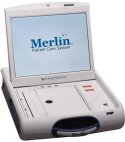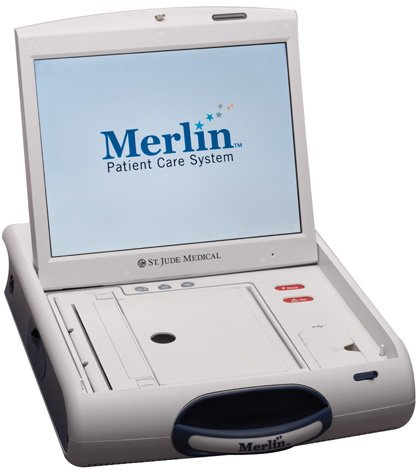Device Profile: Merlin Patient Care System
Jun 8, 2006 — by LinuxDevices Staff — from the LinuxDevices Archive — 23 views IBM and St. Jude Medical used embedded Linux to build a device that lets cardiac care clinicians retrieve and analyze data from implanted cardioverter defibrillators (ICDs) and pacemakers, and make programmatic changes to them. The St. Jude Merlin Patient Care System runs a customized MontaVista Linux operating system on an Intel Pentium M processor.
IBM and St. Jude Medical used embedded Linux to build a device that lets cardiac care clinicians retrieve and analyze data from implanted cardioverter defibrillators (ICDs) and pacemakers, and make programmatic changes to them. The St. Jude Merlin Patient Care System runs a customized MontaVista Linux operating system on an Intel Pentium M processor.

St. Jude Medical's Merlin Patient Care System
IBM says its newly formed Technology Collaboration Solutions (TCS) unit helped St. Jude with PCB (printed circuit board) design and housing engineering, LCD “touch-point” display integration, and the implementation of Merlin's Linux 2.4-based operating system. Additionally, IBM TCS has a seven-year agreement to subcontract Merlin manufacturing on behalf of St. Jude.
St. Jude says Merlin supports current and previous-generation ICDs and pacemakers, and that the device speeds up the cardiac patient care process.
What's under the hood?
Merlin is based on an Intel Pentium M processor, running at an unspecified clockspeed. It comes with 512 MB of ECC (error-correction code) memory, expandable to 1.5GB.
I/O interfaces include:
- USB, used to connect Merlin's internal printer, and for the attachment of external peripherals such as flash drives
- Ethernet/Modem/WiFi network interfaces connected through a PCMCIA/CardBus interface
- Interfaces to ECG (electro-cardiograph) and RF (radio frequency) telemetry equipment
On the software side, Merlin runs a customized version of MontaVista Linux, along with a graphics stack based on Trolltech's Qt and the kernel framebuffer.
According to an IBM spokesperson, IBM selected Linux “because of its availability of rich open source applications, and its ability to meet certain real-time response requirements. Cost also played a large factor, as well as access to the open source community for support (versus depending on a single company for support).”
The IBM spokesperson added, “Linux provides complete flexibility to modify the way we want to run the OS.”
Michael J. Coyle, president of St. Jude Medical's cardiac rhythm management division, stated, “We worked closely with our clinician customers and the team at IBM to create a more comprehensive, streamlined patient implant and follow-up system. The result enables physicians to provide the same high standard of care for patients in significantly less time.”
Joseph Nemeth, VP of medical solutions for IBM's TCS unit, stated, “Increasingly, companies must collaborate with key technology and channel partners to achieve the new level of innovation required for success. Through our engagement with St. Jude Medical, we provided a full range of resources, industry experience, engineering and design consulting, which enabled St. Jude Medical to focus on its core competencies and deliver an innovative solution to the market.”
IBM says its newly formed TCS unit offers an opportunity for customers outside the data center to “rethink and reinvent their R&D operations and the products they bring to market.” The unit combines a number of IBM's internal organizations, including micro-electronics, technology development and manufacturing, OEM component sales, OEM systems sales, systems and technology group intellectual property, next-generation telecommunications, and engineering and technology services.
Availability
Merlin was approved by the U.S. Food and Drug Administration (FDA) in April, and St. Jude Medical began shipping the device this month to clinics, hospitals, and medical facilities worldwide, it says.
This article was originally published on LinuxDevices.com and has been donated to the open source community by QuinStreet Inc. Please visit LinuxToday.com for up-to-date news and articles about Linux and open source.